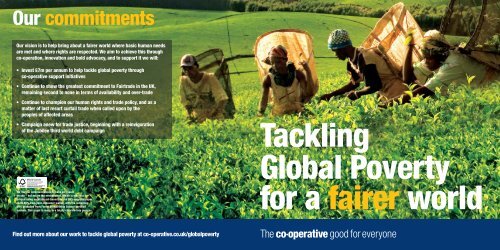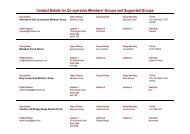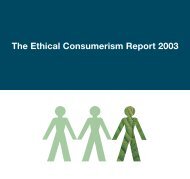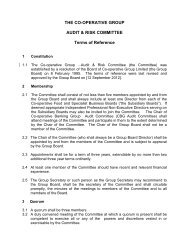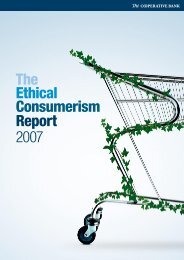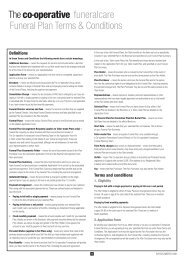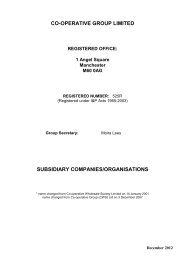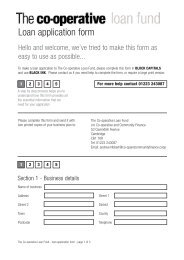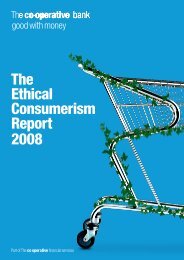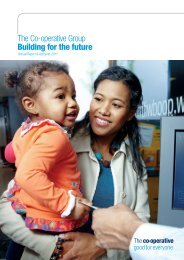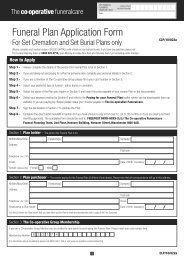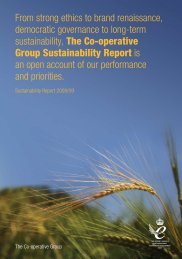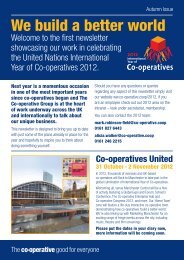global poverty new brochure - The Co-operative
global poverty new brochure - The Co-operative
global poverty new brochure - The Co-operative
Create successful ePaper yourself
Turn your PDF publications into a flip-book with our unique Google optimized e-Paper software.
Our commitments<br />
Our vision is to help bring about a fairer world where basic human needs<br />
are met and where rights are respected. We aim to achieve this through<br />
co-operation, innovation and bold advocacy, and to support it we will:<br />
• Invest £7m per annum to help tackle <strong>global</strong> <strong>poverty</strong> through<br />
co-<strong>operative</strong> support initiatives<br />
• <strong>Co</strong>ntinue to show the greatest commitment to Fairtrade in the UK,<br />
remaining second to none in terms of availability and over-trade<br />
• <strong>Co</strong>ntinue to champion our human rights and trade policy, and as a<br />
matter of last resort curtail trade when called upon by the<br />
peoples of affected areas<br />
• Campaign a<strong>new</strong> for trade justice, beginning with a reinvigoration<br />
of the Jubilee third world debt campaign<br />
Tackling<br />
Global Poverty<br />
We like our communications to have an impact<br />
on you – but not on the environment. Which is why this is<br />
printed using vegetable oil-based inks on 80% recycled paper<br />
(with 60% from post-consumer waste), with the remaining<br />
20% produced from Forest Stewardship <strong>Co</strong>uncil certified<br />
sources. This paper is made in a totally chlorine-free process.<br />
for a fairer world<br />
Find out more about our work to tackle <strong>global</strong> <strong>poverty</strong> at co-<strong>operative</strong>.co.uk/<strong>global</strong><strong>poverty</strong>
Whilst a world without extreme <strong>poverty</strong> might seem like a distant dream, significant<br />
progress in the fight against <strong>global</strong> <strong>poverty</strong> has been achieved in recent years.<br />
As a co-<strong>operative</strong>, we’re owned by our members, so we don’t have to answer to<br />
stock markets and speculators. Following a survey to shape <strong>The</strong> <strong>Co</strong>-<strong>operative</strong>’s<br />
<strong>Co</strong>mmunity Plan, our members overwhelmingly agreed that tackling <strong>global</strong> <strong>poverty</strong><br />
deserves our support. As such, we are now doing more than ever across our family<br />
of businesses to help tackle <strong>global</strong> <strong>poverty</strong>, through ethical trade, co-<strong>operative</strong><br />
support, ethical finance and campaigning.<br />
We are proud to have led UK businesses through our initiatives to tackle <strong>global</strong><br />
<strong>poverty</strong>. We understand that there is no ‘quick fix’ solution, but that through a<br />
targeted combination of activities we can maximise our impact and help ensure<br />
lasting change.<br />
Our vision is to help bring about a fairer world, where basic human needs are met<br />
and where rights are respected. Already our work has benefited millions of people<br />
across the developing world, some of whom are introduced in this booklet. I believe<br />
that with your support, we will be able to help millions more in years to come. If you<br />
share that belief, please join us in tackling <strong>global</strong> <strong>poverty</strong>.<br />
<strong>Co</strong>ver: Workers at the Satemwa tea estate, which we supported to become the<br />
first Fairtrade certified tea plantation in Malawi, and where communities are<br />
benefiting from a project to improve access to water, sanitation and green energy.<br />
Peter Marks,<br />
Group Chief Executive<br />
<strong>The</strong> <strong>Co</strong>-<strong>operative</strong> Group.
Tackling <strong>global</strong> <strong>poverty</strong> for a fairer world<br />
In recent years, our initiatives have benefited millions of people in countries across the<br />
developing world, as indicated by the white honeycombs. Be that through co-<strong>operative</strong><br />
support initiatives, Fairtrade sales, microfinance loans or campaigns.<br />
For more information visit co-<strong>operative</strong>.co.uk/<strong>global</strong><strong>poverty</strong>
Ethical Trade<br />
When undertaken equitably, and with respect for human rights,<br />
trade has an unparalleled capacity to lift people out of <strong>poverty</strong><br />
and enhance quality of life across the world. We have<br />
pioneered ethical trading for over 165 years, since the<br />
Rochdale Pioneers made a stand against <strong>poverty</strong> and<br />
exploitation. Today we continue to operate to our founding<br />
values and principles, which is why we are passionate about<br />
Fairtrade and helping improve supply chain conditions.<br />
It’s important to our members too; in our Food Ethical Policy<br />
consultation over 100,000 of them voted and ranked ‘ethical<br />
trading’ as the single most important issue.
Fairtrade<br />
We were the first major retailer to champion Fairtrade, pioneering<br />
the sale of fairly traded goods before the Fairtrade Mark was even<br />
introduced. We continue to be recognised by consumers as the<br />
leading supermarket for Fairtrade, and have consistently higher<br />
sales of Fairtrade products for the size of our business than our<br />
competitors. In 1998, we launched our strategy to ‘mainstream<br />
Fairtrade’ and today our objectives have been achieved, with some<br />
of Britain’s biggest brands making major range conversions to 100%<br />
Fairtrade. We’re second to none in terms of Fairtrade availability,<br />
with Fairtrade products in every one of our 2,900 Food stores across<br />
the British Isles, from Brae in the Shetlands to Penzance in <strong>Co</strong>rnwall.<br />
Furthermore, since the acquisition of Somerfield, our Fairtrade<br />
products have been brought to millions more shoppers, benefiting<br />
tens of thousands more Fairtrade producers and workers.<br />
Sound sourcing<br />
We’re committed to continually improving the working conditions in<br />
our supply chains, for the hundreds of thousands of people, in over<br />
50 countries, that make our products. We were a founding member<br />
of the Ethical Trading Initiative and we work in partnership with our<br />
suppliers and key stakeholders on collaborative projects and training<br />
to improve working conditions. <strong>The</strong> transparency with which we<br />
report details of our suppliers’ audit issues is leading amongst our<br />
competitors and we’re also the only major retailer to have a Human<br />
Rights and Trade Policy, which sets out the exceptional circumstances<br />
in which we will suspend trade with a certain nation state.<br />
Fairtrade firsts – to name but a few<br />
“Fairtrade is helping to truly revitalise the olive farming<br />
sector in many parts of the West Bank by guaranteeing<br />
farmers fair prices and living wages” Mahmoud Issa, olive<br />
farmer from the village of Anin, Palestine, and member of one of the<br />
co-<strong>operative</strong>s producing Fairtrade certified olive oil.<br />
© Zaytoun CIC<br />
1992<br />
First supermarket to stock<br />
fair trade coffee<br />
2000<br />
First to stock Fairtrade<br />
bananas in the UK and to<br />
launch an own-brand<br />
Fairtrade product,<br />
milk chocolate 2001<br />
First to launch own- brand<br />
fairly-traded wine in advance<br />
of international<br />
Fairtrade standards<br />
2007<br />
UK’s first supermarket to<br />
introduce a Fairtrade<br />
cotton carrier bag<br />
2008<br />
First supermarket<br />
to convert all own-brand<br />
hot beverages<br />
to Fairtrade<br />
2009<br />
First supermarket<br />
to stock Fairtrade<br />
Palestinian<br />
olive oil
<strong>Co</strong>-<strong>operative</strong><br />
Support<br />
As a co-<strong>operative</strong>, we share our profits with our members<br />
and also invest them back into our business and our communities.<br />
We’re investing £7m each year into co-<strong>operative</strong> support initiatives<br />
in some of the world’s poorest countries. We do this in a wide<br />
variety of ways with involvement from our members and<br />
customers. <strong>The</strong> initiatives we support go beyond Fairtrade<br />
commitments alone, and equip poor communities to better help<br />
themselves towards lasting improvements.
Support for overseas co-<strong>operative</strong>s<br />
<strong>The</strong> United Nations, International Labour Organisation and European<br />
Union have recognised that co-<strong>operative</strong>s offer one of the only forms<br />
of organisation that meets all elements of <strong>poverty</strong> alleviation.<br />
<strong>The</strong> <strong>Co</strong>-<strong>operative</strong> Enterprise Hub seeks to support the development<br />
of co-<strong>operative</strong> businesses both in the UK and worldwide, including<br />
Kenya, South Africa, Turkey, Panama and Malawi. In Kenya, we’re<br />
supporting over 10,000 smallholder tea farmers to organise into<br />
co-<strong>operative</strong>s. This offers many benefits, such as improving<br />
negotiating power and access to markets, and help is also being<br />
provided so they can achieve Fairtrade certification, making them<br />
eligible to supply ‘co-<strong>operative</strong> to co-<strong>operative</strong>’ into our ‘99’<br />
Fairtrade tea blend. And in South Africa, we’re supporting an<br />
innovative project to set up and run funeral co-<strong>operative</strong>s. <strong>The</strong>se are<br />
designed not only to address rising costs faced by poor<br />
communities, but also to offer workable co-<strong>operative</strong> models for<br />
wider replication.<br />
Water, sanitation and green energy<br />
<strong>The</strong> World Health Organisation has calculated that for every $1<br />
invested in water and sanitation, $8 is typically returned in terms of<br />
money saved through improved health and productivity.<br />
We believe the combination of improving access to water, sanitation<br />
and green energy helps to improve basic conditions and hence<br />
provides an important platform for future successful development.<br />
We are therefore delivering water pumps, toilets and fuel-efficient<br />
cooking stoves to farmers and workers in our supply chain, including<br />
those in Malawi, Panama and Mozambique. And in Togo, <strong>The</strong><br />
<strong>Co</strong>-<strong>operative</strong> Pharmacy is working in partnership with UNICEF, on a<br />
large-scale project to help deliver a step-change in sanitation.<br />
Products and services<br />
Our customers help raise money for <strong>global</strong> <strong>poverty</strong> charities, through<br />
the charity credit cards they use, the affinity products they buy,<br />
such as <strong>The</strong> <strong>Co</strong>-<strong>operative</strong> Fairbourne Springs ethical water, and the<br />
holidays they book, via donations to the Travel Foundation. <strong>The</strong>se<br />
donations fund initiatives including providing access to clean water in<br />
southern Africa.<br />
“I used to spend a lot of time collecting water for my family,<br />
which in most cases was not enough. I now have safe water<br />
to use at home and I believe this will improve the health of<br />
my family” Mrs Ziwere Kayipa, Bauleni village, Malawi, talking about<br />
the <strong>new</strong>ly installed water pump (pictured) in her community, funded by<br />
<strong>The</strong> <strong>Co</strong>-<strong>operative</strong>.<br />
Fairtrade<br />
premiums<br />
£7m<br />
One<br />
condoms<br />
Water,<br />
sanitation<br />
and green<br />
energy<br />
Overseas<br />
co-<strong>operative</strong><br />
development<br />
Carbon<br />
offset<br />
projects<br />
In addition, we offer carbon offsets with our mortgages, holidays and<br />
insurance policies, which fund projects such as treadle pumps in<br />
India and fuel-efficient stoves in Cambodia. <strong>The</strong>se projects not only<br />
reduce carbon dioxide emissions, but offer significant social benefits<br />
to the communities involved.<br />
Charity<br />
credit<br />
cards<br />
Fairbourne<br />
Springs<br />
Travel<br />
Foundation
Ethical<br />
Finance<br />
<strong>The</strong> <strong>Co</strong>-<strong>operative</strong> has long recognised that the provision of<br />
ethical finance is fundamental to creating a fairer and more<br />
just society. This recognition is shared by our customers and<br />
members, who voted for their money to help alleviate <strong>poverty</strong><br />
and oppression around the world. Through our bank we're<br />
providing finance to people trading their way out of <strong>poverty</strong>,<br />
and through our asset management we’re pushing the<br />
companies we invest in to protect the rights of workers in the<br />
world’s poorest communities. What’s more, we're proud to<br />
have refused over £300m of bank finance to organisations<br />
that exploit people in developing countries or undermine<br />
<strong>global</strong> human rights.
Ethical Policies<br />
Our bank’s Ethical Policy is unique to UK high street banking. Based<br />
on extensive consultation with customers, it sets out which<br />
institutions the bank will and will not finance, in line with customers’<br />
ethical concerns. <strong>The</strong> Policy has been at the forefront of ethical<br />
finance since 1992, and since its inception, over £300m of finance<br />
has been declined from organisations in conflict with our position on<br />
international development and human rights. <strong>The</strong> Policy is regularly<br />
updated to ensure it remains in line with customers’ views and at its<br />
last update in 2009, over 80,000 customers participated in the<br />
consultation process.<br />
Microfinance<br />
We actively support microfinance – the provision of financial<br />
services to the working poor in the form of small loans which are<br />
provided by microfinance institutions (MFIs). Our bank has created<br />
a $50m microfinance fund to help support the development of small<br />
businesses, in association with international banks, in some of the<br />
world’s poorest countries. Via this fund, we have so far helped<br />
support MFIs in 27 countries across the globe, from locations<br />
ranging from Mexico to <strong>Co</strong>ngo. <strong>The</strong> small loans made by these MFIs<br />
help set up <strong>new</strong> micro-businesses such as selling clothes or crafts,<br />
raising livestock or growing crops.<br />
Additionally, our Ethical Engagement Policy guides our insurance and<br />
investments businesses, allowing us to push the companies in which<br />
we hold shares to improve their ethical performance, again in line<br />
with customers’ ethical concerns. This is achieved by voting or<br />
tabling resolutions at company AGMs, or lobbying companies on<br />
specific international development and human rights issues, such as<br />
improving access to medicines in developing countries.<br />
Engaging<br />
in irresponsible<br />
marketing practices<br />
in developing<br />
countries<br />
Manufacturing<br />
or transferring<br />
torture<br />
equipment<br />
A loan recipient, funded by FINCA Kyrgyzstan, who used her loan to set<br />
up a business selling traditional hats. <strong>The</strong> FINCA Microfinance Fund is<br />
one of three microfinance schemes already funded by our bank’s<br />
$50m fund, working around the world to target the poorest of the<br />
working poor.<br />
© FINCA<br />
Failing<br />
to implement<br />
basic labour rights<br />
as set out in the<br />
Fundamental ILO<br />
<strong>Co</strong>nventions<br />
Manufacturing<br />
or transferring<br />
indiscriminate<br />
weapons<br />
Failing<br />
to uphold basic<br />
human rights<br />
Manufacturing<br />
or transferring<br />
armaments to<br />
oppressive<br />
regimes<br />
Over £300m<br />
declined in conflict with<br />
our position on international<br />
development and<br />
human rights<br />
Advocating<br />
discrimination<br />
or incitement<br />
to hatred<br />
Links to<br />
an oppressive<br />
regime that are a<br />
continuing cause<br />
for concern<br />
Taking an<br />
irresponsible approach<br />
to the payment of tax in<br />
the least developed<br />
countries<br />
Impeding<br />
access to basic<br />
human necessities,<br />
e.g. safe drinking<br />
water or vital<br />
medicines
Campaigning<br />
We recognise that ethical consumerism and voluntary giving<br />
alone is not enough to tackle <strong>global</strong> <strong>poverty</strong>, and that mass<br />
mobilisation is needed to push for broader political change.<br />
As a co-<strong>operative</strong>, we are able to involve our members in a<br />
way that most of our competitors cannot. We have a long<br />
history of advocating for change and raising awareness on<br />
development issues via campaigns, outreach events and<br />
education with our members, customers and the general<br />
public. Over the years we’ve helped tackle various challenging<br />
issues ranging from debt relief to trade justice, and from<br />
human rights to climate justice.
History of mobilisation<br />
We have a history of campaigning on issues that matter to our<br />
members and customers, and over the years we have run numerous<br />
successful campaigns. In 2005, we campaigned for trade justice in<br />
partnership with Christian Aid. This resulted in the biggest ever mass<br />
lobby of Parliament, and an overnight vigil in Westminster attended<br />
by more than 25,000 people. In 2009, we supported <strong>The</strong> Wave<br />
campaign with the Stop Climate Chaos <strong>Co</strong>alition and Oxfam.<br />
Over 2,500 of our members joined us on the day to call on world<br />
leaders to agree a safe and fair deal for developing countries on<br />
climate change. We’re still the only major business to mobilise our<br />
customers to take action on these issues.<br />
Outreach<br />
We are also increasingly using <strong>new</strong> channels – such as film<br />
screenings and plays – to inspire our members and the public to<br />
engage on <strong>global</strong> <strong>poverty</strong> issues. To re<strong>new</strong> the case for trade justice,<br />
we supported the premiere and screenings of the film Black Gold in<br />
2007, and showings of the documentary <strong>The</strong> Great African Scandal<br />
in 2008, with thousands of our members attending. We also<br />
supported the distribution of Burma VJ in 2009, linking the film<br />
premiere via satellite to 40 cinemas simultaneously across the UK.<br />
<strong>The</strong> film tracks young ‘video journalists’ risking their lives to tell the<br />
story of the 2007 Burmese uprisings and subsequent repression by<br />
the ruling military regime.<br />
‘Unfinished business’<br />
Over ten years ago, we campaigned for the cancellation of third world<br />
debt and helped make significant progress. But we still see this<br />
as unfinished business, so we’re campaigning<br />
once again with the Jubilee Debt Campaign<br />
and Jubilee Scotland for the remaining<br />
debt to be cancelled and for fairer<br />
lending in the future.<br />
“I’d never been on a march before but was reassured by<br />
<strong>The</strong> <strong>Co</strong>-<strong>operative</strong>’s involvement and felt safe to join in and<br />
show my support. It was an inspiring day and I’m sure no<br />
other business could get so many people to travel from<br />
across the country” Member of <strong>The</strong> <strong>Co</strong>-<strong>operative</strong> attending<br />
<strong>The</strong> Wave march.<br />
1996-2000<br />
Landmines campaign<br />
Third world debt campaign<br />
Members successfully support<br />
campaign to make Garstang<br />
the first Fairtrade town<br />
2001-2005<br />
Cluster Bombs campaign<br />
We support Manchester and Salford<br />
to become 100th Fairtrade town<br />
Trade justice campaign<br />
2006-2008<br />
Member screenings of Black<br />
Gold and the Great African Scandal<br />
60th anniversary of the Universal<br />
Declaration of Human<br />
Rights campaign<br />
2009-present<br />
Member screenings of Burma VJ<br />
‘<strong>The</strong> Wave’ climate justice campaign<br />
‘Unfinished business’<br />
debt campaign
We can make our world fairer


